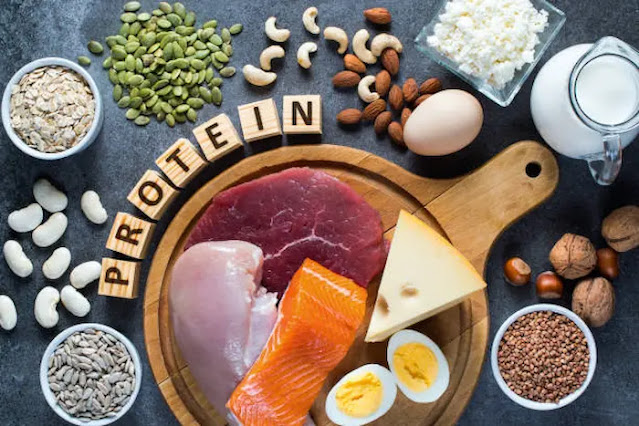The Ultimate Guide to High-Protein Foods: Top 10 Sources of Protein for a Healthy Diet
Welcome to our blog post that dives into the world of protein-rich foods! Whether you're an athlete looking to build muscle, a health-conscious individual aiming for a balanced diet, or a vegetarian seeking alternative protein sources, this guide will provide you with valuable insights. In this article, we'll explore the top 10 sources of protein, discuss their benefits, and help you understand how to incorporate them into your meals for optimal nutrition.
Top 10 Sources of Protein for a Healthy Diet
Lean Meats: Fuel Your Body with Protein
Lean meats are often the go-to option when it comes to protein-rich foods. They are packed with essential amino acids, iron, and vitamins. Here are some examples of lean meats:
- Chicken breast: A 3-ounce serving provides about 26 grams of protein.
- Turkey: A great alternative to chicken, with similar protein content.
- Lean beef: Opt for cuts like sirloin, tenderloin, or ground beef with low-fat content.
- Pork tenderloin: An excellent choice with 22 grams of protein per 3-ounce serving.
Fish and Seafood: Dive into Protein-Rich Delights
Fish and seafood are not only excellent sources of protein but also rich in omega-3 fatty acids. Incorporate the following options into your diet:
- Salmon: A 3-ounce serving contains approximately 22 grams of protein.
- Tuna: Both canned and fresh tuna are protein powerhouses.
- Shrimp: Low in fat and calories, shrimp offers about 20 grams of protein per 3-ounce serving.
Eggs: A Nutrient-Dense Protein Package
Eggs are a versatile and affordable protein source, offering numerous health benefits. They are rich in vitamins, minerals, and antioxidants. Enjoy them boiled, scrambled, or in various other preparations.
Dairy Products: Calcium and Protein Combo
Dairy products are not only high in protein but also an excellent source of calcium. Incorporate these options into your diet:
- Greek yogurt: A 6-ounce serving contains about 17 grams of protein.
- Cottage cheese: A half-cup of cottage cheese provides approximately 14 grams of protein.
- Milk: Choose low-fat or skim milk for a protein boost.
Legumes: Plant-Based Protein Powerhouses
Legumes are a fantastic vegetarian protein source and offer a range of essential nutrients. Include these legumes in your diet:
- Lentils: Cooked lentils provide around 18 grams of protein per cup.
- Chickpeas: Versatile and packed with protein, they can be enjoyed in salads, stews, or hummus.
- Black beans: A cup of cooked black beans offers approximately 15 grams of protein.
Quinoa: The Superfood Grain
Quinoa is a complete protein, meaning it contains all nine essential amino acids. It's a popular choice among vegetarians and vegans due to its high protein content. A cooked cup of quinoa contains about 8 grams of protein.
Tofu and Tempeh: Plant-Based Alternatives
Tofu and tempeh are soy-based products and are excellent vegetarian alternatives to meat. They provide a significant amount of protein:
- Tofu: A 3-ounce serving provides around 8 grams of protein.
- Tempeh: The same serving size offers approximately 15 grams of protein.
Nuts and Seeds: Protein-Packed Snacks
Nuts and seeds are not only delicious but also rich in protein, healthy fats, and fiber. Enjoy them as snacks or as toppings for your dishes:
Almonds: A quarter-cup of almonds offers about 7 grams of protein.
Chia seeds: A tablespoon of chia seeds contains around 2 grams of protein.
Pumpkin seeds: A quarter-cup of pumpkin seeds provides approximately 8 grams of protein.
Protein Supplements: Convenient Options
Protein supplements like whey protein, pea protein, and soy protein powder are popular among fitness enthusiasts. They provide an easy and quick way to increase protein intake, especially after workouts.
Seitan: A Meat Substitute
Seitan, also known as wheat meat or wheat gluten, is a meat substitute made from gluten. It's particularly popular among vegetarians and vegans due to its meat-like texture and high protein content. A 3-ounce serving of seitan contains around 20 grams of protein.
Conclusion
Incorporating protein-rich foods into your diet is crucial for maintaining a healthy lifestyle. Whether you prefer animal-based or plant-based sources, there are numerous options to choose from. Remember to combine protein sources with a variety of fruits, vegetables, and whole grains to ensure a well-rounded diet. Consult with a healthcare professional or nutritionist to determine the best protein intake for your specific needs. Start enjoying the benefits of these top 10 sources of protein and nourish your body from within!

